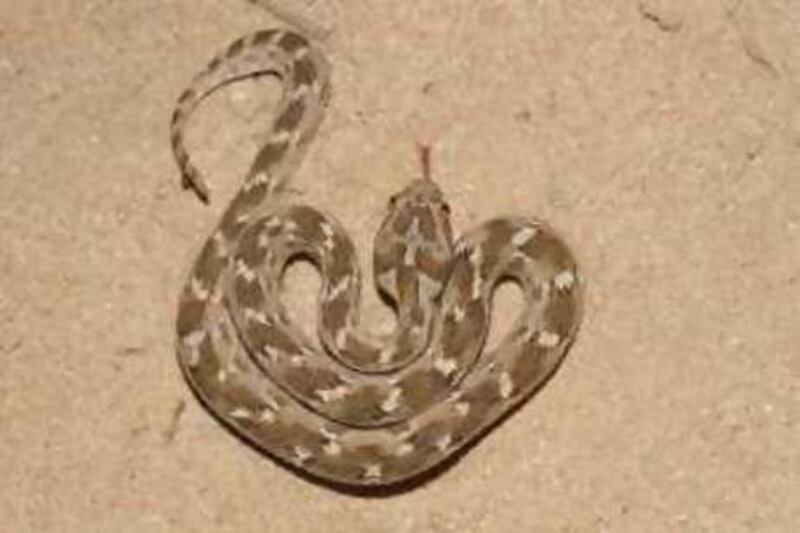RAS AL KHAIMAH // Reg Furlong learned an important lesson on Saturday night about snakes: stay away, especially if you don't know anything about them. He also learned that if you are bitten by a poisonous snake, quick treatment is not a sure thing. A saw-scaled viper bit Mr Furlong, 61, at the Ras al Khaimah Sailing Club, where he is commodore. He is being treated at Saif Hospital for kidney problems attributed to the venomous bite on his finger, but his wife said he was turned away from two hospitals because they could not treat snake bites.
Mr Furlong's wife, Jo, told the story: "It was about 6pm on Saturday and we were just preparing to go home from the sailing club. Someone said, 'There's a snake in the storeroom'. So they all go in to have a look at it. It's a tiny little thing, 25cm wrapped around. I said, 'I think it's poisonous'. Reg said, 'Don't be silly. They don't have poisonous snakes here'. "So we said, 'Let's just put it in a bucket and put it outside'. Reg came out a minute later and said he was bitten.
"We drove to RAK Hospital and they said, 'We don't do snake bites'. Saqr Hospital says, 'We don't do snake bites, Saif does'." The family considered transferring him to Dubai, but were told that the American Hospital also could not treat snake bites and that Rashid Hospital, known forits snake treatment units, does not have a dialysis machine. A doctor at Saqr Hospital said yesterday that snake bites can be treated there, but that Saif Hospital is a better bet.
Mrs Furlong brought the snake with her to the hospital, trapped in a covered bucket, so it could be identified. A spokesman for Civil Defence said officers killed it with a fire extinguisher. There are two types of saw-scaled vipers in the UAE: echis carinatus, found around gravel planes and common throughout the UAE, and echis omanensis, which prefer mountains and wadis. "The saw-scaled viper is the most dangerous snake in Arabia," said Drew Gardner, a biology professor at Zayed University and an authority on snakes.
"They have a fairly powerful haemotoxic venom. It destroys the coagulation of the blood and untreated it can lead to kidney failure and death. They are not particularly aggressive and rub their scales together as a warning, which makes a loud hissing." Mr Gardner stressed that snakes should not be approached or provoked, even if they appear to be dead. People also ought not kill them: "Snakes have a role in the environment and they are part of nature here. They should not just kill snakes because they are there."
Mrs Furlong said her husband's condition will remain uncertain for at least a week. He will require three or four dialysis treatments, she said. She expressed concern about people's inability to identify the snake or know that it was dangerous. "We wouldn't have gone anywhere near this snake if we'd had any idea," she said. @Email:azacharias@thenational.ae





